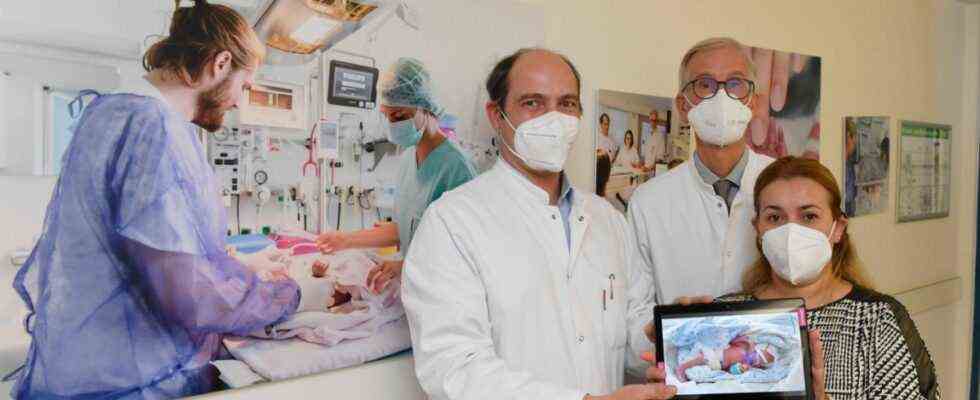When she wakes up, there is some confusion. Then comes worry. Is my child okay? When can i see it Those were her first thoughts after the coma, recalls Imenta Theodoridou. The 36-year-old contracted the corona virus in mid-September when she was seven months pregnant. The virus made her so weak within days that the doctors had no choice but to fetch the child early – under general anesthesia and by means of a caesarean section, because by then Theodoridou had to be artificially ventilated. The girl survived, the mother recovered. Now she wants to tell her story.
At that time, she was not vaccinated against Corona, says the mother, who comes from Greece. “We only knew Corona from television, it was all so far away.” The gynecologist Christofer Marioglou sits next to her and translates. The woman with the light, long hair can best talk about what happened to her in her mother tongue.
It was one of her older children that Corona brought home from school. One after the other, all four children had a fever for a few days, then it was over again. The father and mother got it worse. Her husband was in Schwabing and got oxygen there, she says. At the same time she came to the Munich Clinic in Harlaching herself. Imenta Theodoridou had to be especially careful – after all, her body took care of another living being that was actually not yet fully developed. It was almost two months until the expected delivery date on December 9th. But Corona has left her and the baby no time.
A team of 40 doctors takes care of the patient
The aggressive Delta variant attacked the placenta, which is central to supplying the baby, and at the same time also the mother’s lungs, so that she and the child no longer received enough oxygen. The patient’s condition deteriorated so much within two days that she had to be intubated, recalls Christoph Scholz, chief physician at the gynecological clinics in Harlaching and Neuperlach. Together with Marcus Krüger, the chief physician of neonatology in Harlaching and Schwabing, he looked after Theodoridou. Overall, however, a team of around 40 highly qualified doctors from various disciplines such as perinatology and neonatology took part, Intensive care medicine, says Scholz. It is only thanks to the close cooperation that it is possible to save such seriously ill mothers and their premature babies.
“It’s a constant weighing of when to take the child out,” says Krüger. With each passing day the baby matures in the womb, but with each passing day the oxygen supply becomes more and more critical. In the case of Theodoridou, it was clear on September 21: the child had to go out, otherwise it would not survive. The creature, weighing 1.1 kilograms, was born with a caesarean section. The mother did not notice anything, she was in an artificial coma and was ventilated.
There have been around five such cases in Harlaching since the beginning of the pandemic, and just as many in Schwabing, says Krüger. And so far all the children would have survived. But at what price? Unfortunately, not all premature babies get out of there unscathed. Krüger has also heard from colleagues in other houses of cases in which the children begin their lives as orphans. Her parents died of Corona without ever having seen the children.
“I burst into tears”
Twelve days after the birth, Theodoridou saw her little daughter for the first time. She remembers how overwhelmed she was back then. “I burst into tears.” Even in the intensive care unit, the nurses showed her photos and videos of her child on a specially purchased “Corona tablet”. “I knew she was alive. But I just wanted to hug her,” she says. For the first few weeks of her life, neither father nor mother could be there for the child. “Knowing that hits me very much,” says Theodoridou. Even the entire registration at the registry office, the registration of the name, had to be done by the father himself – he was sick and released early from the hospital to look after the other children. Dimitra is the girl’s name, mother earth. Since the middle of November the little creature has been at home without any serious consequential damage and the family is complete.
“The virus breaks apart what actually belongs together,” says Scholz. The risk of becoming seriously ill is increased for pregnant women, this has long been clear. Without a vaccination, the mother not only risked her own life, but also that of the unborn child. The danger is not passing the virus on to the fetus, it only happens in one to three percent of cases. But the acute undersupply of the child due to the attacked placenta and poor breathing. The rate of miscarriages is also higher with Covid infections. “What depresses me so much: It’s all avoidable,” says Scholz. He hopes that more pregnant women will be vaccinated against corona. There are still far too few vaccinated women in the women’s clinics, says the chief doctor.
When Theodoridou became pregnant, there was still no recommendation from the Standing Vaccination Commission for corona vaccination of pregnant women. It came on the same day that she was admitted to the hospital with Corona. Today it is clear to her, says the mother, that she has taken a risk. “I wouldn’t go into that again today.”

